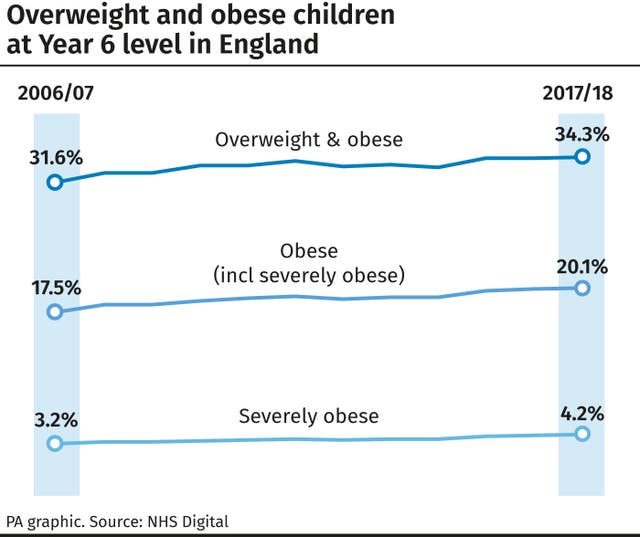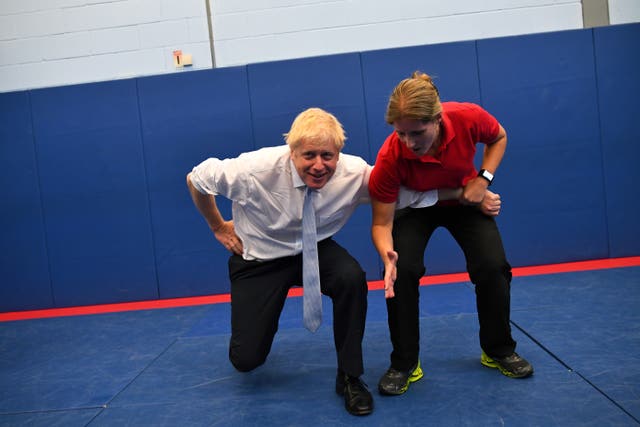Boris Johnson ‘turning back clock’ on obesity fight with ‘sin tax’ review
The Tory leadership frontrunner’s pledge came as Cancer Research UK warned that obesity causes more cases of some cancers than smoking.

Boris Johnson has been accused of “turning back the clock” on the fight against childhood obesity with his pledge to review so-called sin taxes.
The frontrunner in the race to become prime minister came under heavy criticism after promising to review the taxes, including the levy on sugary soft drinks introduced in April last year.
The Tory MP on Wednesday defended his pledge not to introduce new sin taxes or increase current levels unless a review concludes they are effective and do not unfairly hit those on low incomes.
The sugar tax has been celebrated by the Treasury for shrinking the amount of sugar in the national diet by 45 million kg a year and for raising millions in sports funding.
Mr Johnson’s commitment, which excludes taxes on alcohol and tobacco, came as Cancer Research UK warned that obesity causes more cases of some cancers than smoking.
It also came as a key ally of Mr Johnson, Health Secretary Matt Hancock, prepared to publish a green paper recommending the extension of the sugar tax to milkshakes.

Royal Society for Public Health (RSPH) chief executive Shirley Cramer said the organisation was “seriously disappointed” by the announcement and praised moves to tackle childhood obesity.
“One of the successes of the last Conservative government was the introduction of the sugar levy for soft drinks. The evidence shows that the sugar levy has worked,” she said.
“We should be building on the success of the sugar levy, not turning back the clock on the progress that has been made so far.”
Cancer Research UK chief executive Michelle Mitchell praised the successes of taxation on dissuading unhealthy behaviour.
“Physical activity is one way to lose weight but the Government also has a big role to play if we are to significantly reduce obesity levels,” she said.
A snap poll on Wednesday suggested the majority of adults back higher taxes on food and drinks that are high in sugar, salt and fat in order to tackle health issues.
Some 55% of the more than 2,800 polled approved of the measures.
The Tory membership that Mr Johnson must win over to become prime minister also appear to back the taxes, with 54% voicing their approval in the poll.
Foreign Secretary Jeremy Hunt called for his leadership race rival to announce a plan to fix the obesity crisis.
“We have the second highest number of obese young people anywhere in Europe and we do need to have a solution to this,” he said.
“So the people who want to scrap these taxes need to say what is their plan because it’s terrible for the young people involved.”
Shadow health secretary Jonathan Ashworth said the move to “water down” the obesity strategy was “extraordinary”.

Former health minister Steve Brine, who backs Mr Hunt, said he felt “despair” at the proposal, calling it “transparent dog-whistle politics”.
Mr Johnson defended his policy, insisting he would take an evidence-based approach to the obesity crisis.
Speaking during a campaign visit in Berkshire, he suggested that making streets safer for children to encourage children to be active may be a better way to tackle obesity.
“That is, I think, a far, far better solution – encouraging kids to walk and to cycle – than putting punitive taxes on stuff that they eat,” he said.
The proposal also exposed a split in Mr Johnson’s campaign.
Mr Hancock commissioned England’s chief medical officer, Professor Dame Sally Davies, to consider taxing all unhealthy foods to tackle childhood obesity.
The Health Secretary said he was not consulted about Mr Johnson’s announcement in advance, with a source close to him telling PA: “He didn’t know about it before it went out.”
But Mr Hancock backed a review and hailed Mr Johnson as a shining example of getting “fit and svelte” without the need of the “nanny state”.
“Of course there’s the tax, but there’s more ways we can make sure that we tackle obesity,” he told Sky News.
Liz Truss, a rival to Mr Hancock in the contest to become Mr Johnson’s chancellor if he wins the leadership race, has frequently hit out at state intervention in people’s ability to choose what they eat.
She celebrated the policy as “great” because “taxes on treats hit those on lowest incomes”.

As London mayor in 2016, Mr Johnson introduced a 10p levy on all added-sugar soft drinks sold in the City Hall cafe, saying tackling obesity was “one of the biggest” health challenges.
But announcing his latest proposal, he said a tax on milkshakes “seems to me to clobber those who can least afford it”.
“Rather than just taxing people more, we should look at how effective the so-called sin taxes really are, and if they actually change behaviour,” he said.





